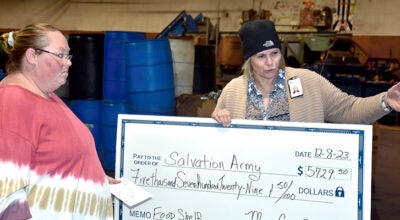City approves auto worker contracts
Published 10:34 am Tuesday, June 18, 2013
Deal ends two-year bargaining turmoil
The Austin City Council finally put an end to more than 2 1⁄2 years of negotiating contracts with the city’s United Auto Workers union members.
Council members voted to approve UAW contracts for Wastewater Treatment Plant and Streets/Sewer Department workers during its Monday night board meeting, capping off an acrimonious and at times public round of bargaining between 42 workers representing the city’s parks and recreation, streets, sewer and treatment plant departments.
“I hope the next round of contracts don’t take so long,” said Councilwoman Judy Enright.
City Administrator Jim Hurm said last week one of the largest hurdles in negotiations was biweekly pay. While UAW negotiators initially resisted switching to a biweekly paycheck — UAW workers had received weekly pay for years — they eventually gave in to the city’s demands.
Yet UAW negotiators said in January that biweekly pay wasn’t as much of an issue as contract language concerning overtime and pay bumps in line with other city departments, as well as comparable units in other cities.
The three UAW unit contracts expired at the end of December 2010, the last in a three-year contract cycle.
The city and UAW workers began negotiations a month prior, but couldn’t come to an agreement after six meetings between November 2010 and February 2011. State mediators came to Austin twice — once in April 2011, and once at the end of last year — to help resolve the situation, but UAW workers in January said the city refused all of the unit’s requests.
“We made zero progress,” Greg Bell, Parks and Rec worker and UAW negotiator, said in January.
UAW workers spoke with the city council at the first council meeting of 2013 to force a break in the stalemate between the city and negotiators, but the council reiterated its support for the city’s bargaining team at the next meeting.
Mayor Tom Stiehm said after the council meeting Monday the biweekly pay issue amounted to a lack of trust between the city and UAW workers, one which likely wasn’t solved by the latest round of negotiations. He said UAW workers were initially resistant to biweekly pay, then wanted specific biweekly pay language inserted in the contract to prevent the city from switching pay periods to a longer wait.
“We wouldn’t do that,” he said.
The contracts cover workers from 2011 on, giving UAW employees 1-2 percent wage increases in 2013 while freezing wages in 2011 and 2012, which means UAW workers won’t have any retroactive pay adjustments.
The council approved the UAW Parks and Recreation contract last month. All UAW contracts will run out at the end of this year, which means the city and negotiators will go back to the bargaining table this winter.




